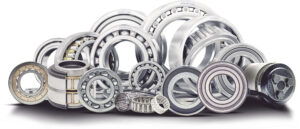Trends of Bearings in Infrastructure Equipment segment
Sanjeev Taparia Chief Sales & Marketing Officer, National Engineering Industries (NBC Bearings). Bearings play a crucial role in various industries, including the construction sector. In infrastructure equipment applications, such as construction machinery and heavy equipment, bearings are essential components that

Sanjeev Taparia
Chief Sales & Marketing Officer, National Engineering Industries (NBC Bearings).
Bearings play a crucial role in various industries, including the construction sector. In infrastructure equipment applications, such as construction machinery and heavy equipment, bearings are essential components that enable smooth movement, reduce friction, and support heavy loads.
Demand Trend of Bearings in Infrastructure Equipment Applications
The construction industry has experienced significant growth in recent years, leading to an increased demand for infrastructure equipment. These equipment, ranging from excavators and cranes to bulldozers and concrete mixers, heavily rely on bearings for their efficient operation. The demand trend for bearings in infrastructure equipment applications has been influenced by several factors:
Infrastructure Development: The expansion of transportation networks, urbanization, and the construction of large-scale projects, such as bridges and skyscrapers, has propelled the demand for infrastructure equipment. Consequently, the demand for bearings used in these machines has also surged.
Equipment Modernization: With technological advancements, construction equipment is becoming more sophisticated and efficient. This shift towards modernization often involves the integration of high-quality bearings to enhance equipment performance, durability, and precision.
Key Engineering Attributes of Construction Industry Bearings
Bearings used in infrastructure equipment applications are designed to withstand heavy loads, high speeds, and harsh operating conditions. These bearings possess key engineering attributes that make them suitable for the construction industry.
Load Capacity: Construction equipment operates under immense loads and forces. Therefore, construction industry bearings are designed to have high load-carrying capacities to ensure reliable performance and prevent premature failure.
Durability and Reliability: The demanding nature of construction sites requires bearings to be exceptionally durable and reliable. These bearings are typically made from robust materials, such as hardened steel or advanced alloys, and undergo stringent testing to ensure they can withstand heavy impacts, vibrations, and contaminants.
Lubrication and Sealing: Construction sites are often exposed to dust, dirt, and other contaminants, which can adversely affect bearing performance. Hence, construction industry bearings incorporate effective sealing mechanisms and lubrication systems to minimize the ingress of contaminants and provide optimal lubrication for smooth operation.
Precision and Accuracy: Some construction equipment, such as cranes and piling machines, rely on precise movements and positioning. Bearings used in such applications need to offer high precision and accuracy to ensure smooth and controlled operations.
Emerging Opportunities in the Construction Equipment Industry for Bearings
The construction equipment industry is evolving rapidly, presenting various emerging opportunities for bearings manufacturers and suppliers:
Technological Advancements: As the construction industry embraces automation, robotics, and IoT technologies, there is a growing need for bearings that can support these advancements. Smart bearings with built-in sensors for condition monitoring and predictive maintenance are gaining traction in the construction equipment sector.
Electric and Hybrid Equipment: The shift towards electric and hybrid construction equipment, driven by environmental concerns and regulations, opens up opportunities for bearings specifically designed for the unique requirements of these machines. Bearings that can handle high torque, operate efficiently at low speeds, and withstand electrical currents are in high demand.
Modular and Customized Solutions: The construction industry is embracing modular and customizable equipment designs to improve flexibility, reduce downtime, and enhance productivity. Bearings that can be easily integrated into various equipment configurations and tailored to specific requirements are becoming increasingly valuable.
Challenges Anticipated in the Bearings Sector
While the bearings sector in the construction equipment industry offers promising opportunities, it also faces certain challenges that need to be addressed:
Cost Pressures: The construction industry is highly competitive, with a strong emphasis on cost-efficiency. Bearings manufacturers must strive to balance performance and quality with cost-effectiveness to remain competitive in the market.
Extreme Operating Conditions: Construction sites expose bearings to extreme conditions, including heavy loads, high temperatures, dust, and moisture. Developing bearings that can consistently perform well under such challenging circumstances requires continuous innovation and advanced engineering.
Sustainability and Environmental Impact: As sustainability becomes a significant focus in the construction industry, bearings manufacturers must ensure their products are environmentally friendly and comply with evolving regulations regarding material usage, waste management, and energy efficiency.
Supply Chain Management: Efficient supply chain management is crucial for bearings manufacturers to meet the demands of the construction equipment industry promptly. Delays or disruptions in the supply chain can impact project timelines and customer satisfaction.
Summary
The demand for bearings in infrastructure equipment applications is driven by the growth of the construction industry, equipment modernization, and the need for maintenance and replacement. Bearings used in the construction industry possess key engineering attributes such as high load capacity, durability, reliability, lubrication, sealing, and precision. Emerging opportunities in the construction equipment industry for bearings include technological advancements, lightweight construction, electric and hybrid equipment, and modular/customized solutions. However, the bearings sector also faces challenges related to cost pressures, extreme operating conditions, sustainability, and supply chain management. Overcoming these challenges through innovation, efficient manufacturing processes, and environmental consciousness will be crucial for the continued success of bearings in the construction equipment industry.

Hits: 4








